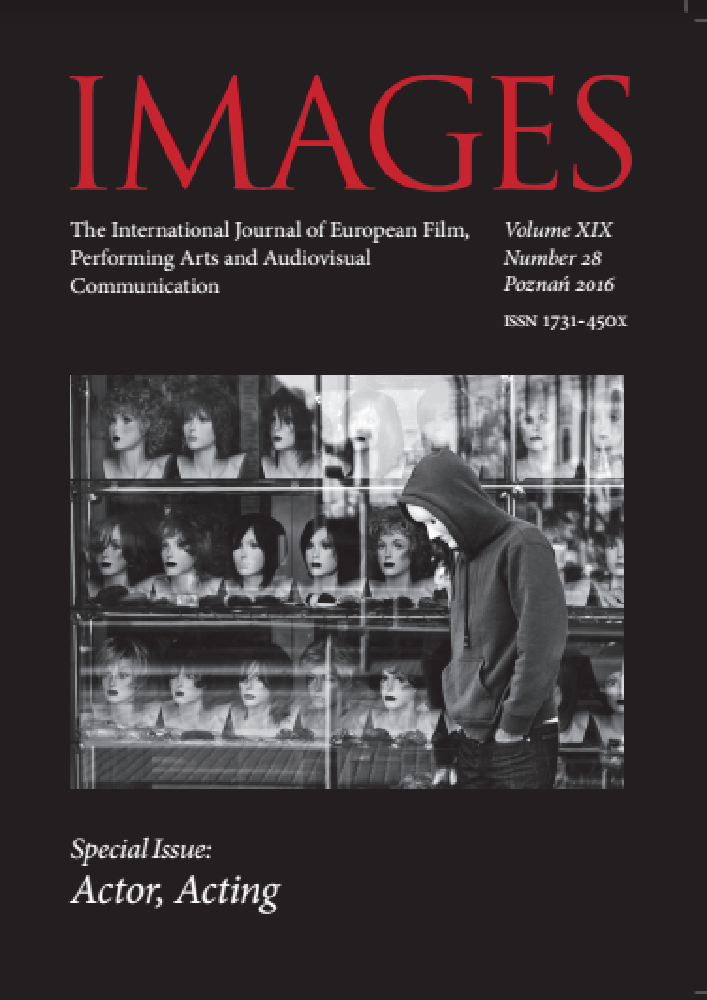Abstract
The quests and fascinations of Antoni Bohdziewicz (1906-1970)The author analyses in detail the structure of the leading role based on the film “I’m yours” His analysis takes into account acting skills, the relations between the protagonists and adversaries and also cinematic time and space. He appreciates the role played by the screenwriter and establishes the principles for cooperation between actors and the director.The author analyses in detail the structure of the leading role based on the film “I’m yours” His analysis takes into account acting skills, the relations between the protagonists and adversaries and also cinematic time and space. He appreciates the role played by the screenwriter and establishes the principles for cooperation between actors and the director.This article is devoted to the director Antoni Bohdziewiczs creative output and teaching work at the Łódź Film School, to commemorate the 110th anniversary of his birth. The author presents Bohdziewiczs early days as a director at Polish Radio in Vilnius, and also his work as a film critic. A significant moment in Bohdziewiczs life was his leaving for Paris on a scholarship on Prof. Władysław Tatarkiewicz’ recommendation, where he produced several short films. On returning to Poland, Bohdziewicz enjoyed success mainly as a reporter for Polish Radio and also as the co-founder of the Imagination Theatre (Teatr Wyobraźni). When war broke out he got involved in underground activities, becoming one of the organisers recording the events of the Warsaw Uprising on film. Bohdziewiczs post-war activities were significantly affected by his appearance at the Filmmakers’ Congress in Wisła (1949), at which he spoke out against introducing the ideas of socialist realism. Bohdziewicz never felt fulfilled as a director, despite producing several films, including documentaries, feature films based on contemporary themes and literary adaptations. His true passion remained his lecturing work at the Łódź Film School. The article quotes many of his pupils and protegees, including Andrzej Wajda, Janusz Majewski, Kazimierz Kutz, who saw him as their master, and their artistic and spiritual guide through those times. Without exception they emphasise how Bohdziewicz lived solely for the School. In his later years he was strongly associated with the Film Discussion Club movement; he occasionally worked in theatre, wrote, and taught at the INSAS Film School in Brussels. With hindsight and from his pupils’ remembrances, it becomes clear just how invaluable his teaching work at the Łódź Film School was
References
Archiwum prywatne Antoniego Bohdziewicza w posiadaniu córki reżysera Anny Beaty Bohdziewicz.
lat Polskiego Radia 1925–1995, brw, pod red. B. Górak-Czerskiej, S. Jędrzejewskiego, Warszawa.
Armatys B., Armatys L., Stradomski W., 1988, Historia filmu polskiego, t. II, Warszawa.
Bohdziewicz A., 1955, Przeciw żywotom niepokalanych, „Głos Robotniczy”, dodatek „Głos Tygodnia” nr 31 (3283, sobota 5 i niedziela 6 lutego), s. 5.
Bohdziewicz A., 1965, Relacja ustna zapisana w rubryce: Archiwum kinomana. Lata wojny, „Ekran” nr 26 (429, 27 czerwca), s. 12.
Bohdziewicz A., 1993, W warsztacie filmowca, red. naukowa, komentarz i przypisy J. Lemann, Łódź.
Bohdziewicz A., 2006, Z listów do córki, „Zeszyty Literackie” 3, s. 79–81.
Byrski T., 1976, Teatr-radio wspomnienia, Warszawa.
Hendrykowska M., 2006, Antoniego Bohdziewicza życie i sprawy, „Kwartalnik Filmowy” nr 54–55 lato – jesień, s. 320–343.
Historia filmu polskiego, 1974, t. III pod red. J. Toeplitza, Warszawa.
Hollender B., Turowska Z., 2000, Zespół „Tor”, Warszawa.
Kaszyński S., 1970, Teatr łódzki w latach 1945–1962, Łódź.
Krubski K., Miller M., Turowska Z., Wiśniewski W., brw, Filmówka. Powieść o łódzkiej szkole filmowej. Warszawa.
Kutz K., 2006, Głosy o Antonim Bohdziewiczu (1906–1970), „Zeszyty Literackie” 3, s. 61–62.
Kwiatkowski M.J., 1980, Tu Polskie Radio Warszawa, Warszawa.
Leksykon polskich filmów fabularnych, 1997, pod red. J. Słodowskiego, Warszawa.
Lubelski T., 1992, Strategie autorskie w polskim filmie fabularnym lat 1945–1961, Kraków.
Majewski J., 2001, Retrospektywka, Warszawa.
Osiński Z., 2005, Nazywał nas bratnim teatrem, Warszawa.
Ozimek S., 1974, Film polski w wojennej potrzebie, Warszawa.
Ozimek S.F., 2007, O Antonim Bohdziewiczu „Wiktorze”, „Kwartalnik Filmowy” nr 57–58, s. 24–39.
Petelska E., 1970, Antoni Bohdziewicz, „Film”, 45 (1144) 8 listopada), s. 10.
Prafilmówka krakowska 1945–1947. Nauczyciele słuchacze filmy, 1998, red. i oprac. J. Albrecht, Kraków.
Smoleń-Wasilewska E., 1970, Film w kasecie – kino w domu. W dyskusji udział biorą: Antoni Bohdziewicz, Stanisław Wohl, Henryk Mocek, Andrzej Skawina, „Film” 30 (1129) 26 lipca, s. 6–7.
Śmiałowski P., 2015, Od Szymka Bielasa do Mateusza Birkuta. http://www.filmweb.pl/news/KINO%3A+Od+Szymka+Bielasa+do+Mateusza+Birkuta>[dostęp: 15.08.2015]
Wajda A., 2006, O Antonim Bohdziewiczu. W stulecie urodzin, „Zeszyty Literackie” 3, s. 56.
Zahorska S., 1933, Kronika filmowa. Poranek filmów eksperymentalnych, „Wiadomości Literackie”, 7 (478, niedziela 5 lutego), s. 6.
Zajiček E., 1992, Poza ekranem. Kinematografia polska 1918–1991, Warszawa.
License

This work is licensed under a Creative Commons Attribution-NonCommercial-NoDerivatives 4.0 International License.
